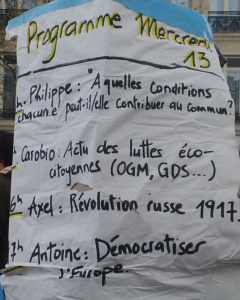Standing up for a democratized Europe!
Public talk (on Mixcloud) – Democratizing Europe – Place de la Republique in Paris – April 13th 2016 – organised by Debout Education Populaire – & book Democratizing Europe
Since the beginning the talk had mostly led to a twofold solution in the Place de la Republique: based on a silent common accord regarding the European democratic deficit, France may either change or leave the European Union (EU).
In the assembly several persons argue for an exit from the EU disputing its form of government. The EU may be “undemocratic”, like a “dictatorship” and may have “taken the democracy away” from the citizens. It did not tally with the definition of “government of the people by themselves”[1]. For some it is its natural state. Its founders, Jean Monnet and Robert Schuman, may have built a “technocratic” system since the European Coal and Steel Community in order to protect the interests of European capital (and not just to strengthen the European economic and industrial potential and rearming through a Franco-German agreement). For others this European project was distorted by the Lisbon Treaty which did not take into account the French rejection of the Constitutional Treaty. Or the European Economic Community (EEC) may previously have lost its soul in the 80’s when the European liberal policy was favoured instead of the French social policy and became a “war machine”. Reference is probably made to the French involvement in the Economic and monetary union which consisted in the free capital flows, the establishment of the European Central Bank (ECB), a single currency and convergence criteria.
Why should we thus leave “this European project” to alter it? The reform of the European Treaties requires today the unanimity of Heads of State and Government (see Article 48 of the Treaty on European Union). “We cannot enter the war machine, we must fight it”. In a word, even if people expressed their will of a democratic European project, the institutional system would turn a blind eye and remain determined. This may be the reason why only one participant addresses the possible change of the EU through parliamentary elections. Besides the public of this square discusses also, or rather, democracy at national level.
In front of this audience and in his book, Antoine Vauchez[2], diagnoses the EU as an ill patient who claims to be healthy and suggests some treatments. The EU is “allergic”,”deaf” and insensitive to democracy. Calling into question the apparently healthy “representative democracy kit” which encompasses European parliamentary elections by direct universal suffrage, political parties, the European citizen’s initiative and nomination of the European Commission (EC) by the European Parliament (EP), the author reminds its medical history and the recent scars wrought by the economic crisis of 2008. Since the Treaty of Rome this European project may have been aiming first and foremost to implement the common market. As such it may have progressed through a bureaucratic and judicial process, which may be justified by its institutional independence and expertise. The EEC may have turned away from general willingness and ideological majorities to focus exclusively on a common good including economic growth and the rule of law. During the last economic crisis the independent institutions, i.e. the EC, the ECB and the European Union Court of Justice, may have strengthened their power on the European construction within the framework of new economic governance structures (Six Packs, Two Packs, European Financial Stabilisation Mechanism, Troika, Banking union). Instead of the political institutions the independent ones may play the role of vital organs building in this way a technocratic system. Instead of being secondary these institutions are at the centre of the European system. Democracy may have become a secondary issue of the European strategy which mainly protects the institutional system.
Why, rather than leaving the EU, should we treat it? Although this European project could not reform itself according to Antoine Vauchez, it could not be overthrown and democracy should enter the system from outside. Should the power of the EP be strengthened? Facing political national activities, the EP may stop fostering political debate for the benefit the European institutional system. Is the situation hopeless? Let’s try to democratise the independent institutions, recognize their political features and support controversies and disagreements regarding several sources of their legitimacy. Their mandates should be publicly discussed. Their data, facts and findings should also be analysed considering the doctrines, methodologies and instruments they used. Moreover their legitimacy, currently based on independence and expertise, should be assessed and increased for instance by new representative aspects (of countries, trade unions, languages…)
This diagnosis, which deserves to be fully read from the book, has not only an impact on the assembly but also on the European narrative told through the concepts of integration and supranationalism. It puts the spotlight on a new angle of the debate, which may have been characterized since the end of the 40’s by development of institutional power (transfers of sovereignty, federalism) and implementation of a binding majority decision making process. On which ideologies is currently founded Europe and will be founded? This discussion on different European projects should dominate every national debate like the Brexit’s one instead of being reduced to support or reject a European project.
[1] Pierre BOURETZ, « Démocratie ». In : Olivier DUHAMEL, Yves MENY, Dictionnaire constitutionnel, PUF, 1992, p 283 à 288
[2] Antoine VAUCHEZ, Democratizing Europe, Palgrave, 2016
*********
!Hey! As next President of the French Republic, which solution will you favour?
This article is available in French.
Do you want to translate and share this article in a new language? Click here!
A comment, a correction? ⇓
